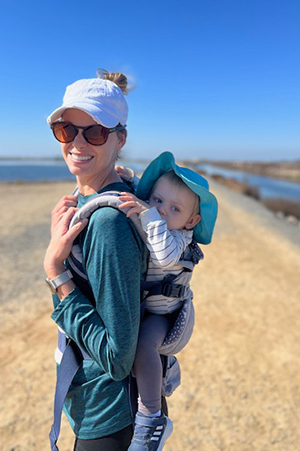“The most rewarding part of studying economics is empowering yourself to become a more informed member of society.”

Coastline College Instructor Stacey Smith hiking with her family's newest addition hitching a ride.
(Image provided by Stacey Smith)
It’s always a great day when we get to catch up with Coastline’s faculty! In this week’s Teacher Feature, we caught up with Economics and Business Professor Stacey Smith, whom we last chatted with back in 2019! This time around, she gave us a bit of insight into how her life has changed since her last feature and went in-depth about all that the world of economics has to offer!
Tell me a bit about yourself! How has your life evolved since your 2019 Teacher Feature?
Since 2019, the size of my family has increased a bit! I now have two little ones. My son is three years old and my daughter is one. While I have a lot less free time these days, I still make sure to get in a day or two of beach volleyball every week. It's my valuable "me" time! I'm still very much enjoying teaching at Coastline and connecting with my students and fellow instructors. I've also added pickleball to my list of hobbies (who hasn't?!).
In your 2019 feature, you mentioned that you accidentally enrolled in a statistics class, which is how you discovered your passion for economics. If that had never happened, what do you think you would be doing?
Oof, what a tough question! I think I may have gone down the environmental studies path. The degree offered at UCSB (where I studied) had a neat mix of natural sciences and social sciences which I liked. I took a "Natural Resources Economics" class during my undergrad time there and really appreciated the topics. That's the cool thing about economics though - it incorporates so many different disciplines! Math, history, psychology, sociology, etc.

Coastline College Economics & Business Instructor, Stacey Smith
What have you learned about yourself as a person and as a teacher while teaching economics?
I've learned that to be the best teacher, I need to understand how my students learn and how they prefer to learn. The way students learn (and how the general population learns, really) is constantly changing and it's important the online classroom follows suit. To be truly in touch with my students, I also need to understand what their commitments are outside of the classroom so I can best tailor the class to their schedules and needs. I've also learned that personally, I'm at my best when I'm challenged. With that in mind, I continue to update my courses and try out different types of activities and assignments. This is all exciting to me!
What is your favorite class to teach?
Of course, I love them all, but I suppose if I were forced to pick one it would be Econ 110- Economic Issues and Policy. I enjoy seeing my students make meaningful connections between the economics we learn about and "real life" issues like education, discrimination, pollution, poverty, homelessness, etc. By learning the economics behind these problems, we are better equipped to advocate for and promote solutions.
Meet the Economics Department @ Coastline
In what ways do you feel economics is vital to our world today?
See the last question!
By learning the economics behind [education, discrimination, pollution, poverty, homelessness, etc.], we are better equipped to advocate for and promote solutions!
- Professor Stacey Smith
What strategies do students learn in economics that apply to their day-to-day lives?
A huge part of economics is learning about and understanding the incentives that drive human behavior. In other words, what makes someone behave the way they do? In economics classes, we pay special attention to consumption and production choices which also allow us the ability to make predictions about people's behavior. The critical thinking component of economics courses will absolutely improve your ability to analyze issues from a new perspective!
What careers are available for economics students to pursue?
Someone with an economics degree will have tons of doors opened to them! While "economist" is what most people think of, career opportunities vary greatly and include sectors like government, law, business/entrepreneurship, banking, and finance, etc. Many analysts (finance, market, policy) come from economics backgrounds. And of course, my very favorite career – teaching! Hiring managers understand that applicants who hold economics degrees have great critical thinking and analysis skills.

Professor Smith and her family take a unique underwater holiday portrait with Santa.
What is the most rewarding part of studying economics, and what do students find the most challenging?
The most rewarding part of studying economics is empowering yourself to become a more informed member of society. Being able to better understand what you hear about in the news, and to contribute to a political or social discussion more confidently is huge! Students find the models and graphs in economics courses to be challenging, but I promise that after you spend time with them, they become second nature and even fun!
For students who are considering economics and business, what advice would you give to them to motivate them to pursue this field of study?
My advice is to remind yourself of the opportunities that this field of study will provide you! Aside from a wide variety of career options (as I previously mentioned) and, of course, the money, other plusses of studying economics and business include the improved ability to think critically and problem-solve, and to generally have a better understanding of the world around you. All the hard work will be worth it!
What advice, tips, or resources would you give to students to be successful in their classes and future careers?
My #1 piece of advice would be to communicate with your instructors! We get sad sitting alone in office hours (ha!) and are always open to meeting with you. Letting us know about any issues you're having will allow us to work with you and keep you on track. Remember, we're on your team! Exploring the resources that Coastline has available to you is also extremely valuable (examples: Career and Transfer Center, food pantry, technology assistance, textbook voucher programs, student life activities, etc.). This advice also holds true after you've finished your time at Coastline. Being able to effectively communicate is important in just about every facet of life. And, having the ability to explore and navigate resources will help you throughout your entire life.